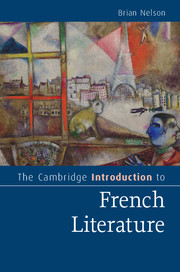Book contents
- Frontmatter
- Dedication
- Contents
- Preface
- Acknowledgements
- Chronology
- 1 Villon: a dying man
- 2 Rabelais: the uses of laughter
- 3 Montaigne: self-portrait
- 4 Corneille: heroes and kings
- 5 Racine: in the labyrinth
- 6 Molière: new forms of comedy
- 7 La Fontaine: the power of fables/fables of power
- 8 Madame de Lafayette: the birth of the modern novel
- 9 Voltaire: the case for tolerance
- 10 Rousseau: man of feeling
- 11 Diderot: the enlightened sceptic
- 12 Laclos: dangerous liaisons
- 13 Stendhal: the pursuit of happiness
- 14 Balzac: ‘All is true’
- 15 Hugo: the divine stenographer
- 16 Baudelaire: the streets of Paris
- 17 Flaubert: the narrator vanishes
- 18 Zola: the poetry of the real
- 19 Huysmans: against nature
- 20 Mallarmé: the magic of words
- 21 Rimbaud: somebody else
- 22 Proust: the self, time and art
- 23 Jarry: the art of provocation
- 24 Apollinaire: impresario of the new
- 25 Breton … Company: Surrealism
- 26 Céline: night journey
- 27 Sartre: writing in the world
- 28 Camus: a moral voice
- 29 Beckett: filling the silence
- 30 French literature into the twenty-first century
- Notes
- Further reading
- Index of authors and titles
- Index of genres, movements and concepts
- Cambridge Introductions to …
- References
23 - Jarry: the art of provocation
Published online by Cambridge University Press: 05 July 2015
- Frontmatter
- Dedication
- Contents
- Preface
- Acknowledgements
- Chronology
- 1 Villon: a dying man
- 2 Rabelais: the uses of laughter
- 3 Montaigne: self-portrait
- 4 Corneille: heroes and kings
- 5 Racine: in the labyrinth
- 6 Molière: new forms of comedy
- 7 La Fontaine: the power of fables/fables of power
- 8 Madame de Lafayette: the birth of the modern novel
- 9 Voltaire: the case for tolerance
- 10 Rousseau: man of feeling
- 11 Diderot: the enlightened sceptic
- 12 Laclos: dangerous liaisons
- 13 Stendhal: the pursuit of happiness
- 14 Balzac: ‘All is true’
- 15 Hugo: the divine stenographer
- 16 Baudelaire: the streets of Paris
- 17 Flaubert: the narrator vanishes
- 18 Zola: the poetry of the real
- 19 Huysmans: against nature
- 20 Mallarmé: the magic of words
- 21 Rimbaud: somebody else
- 22 Proust: the self, time and art
- 23 Jarry: the art of provocation
- 24 Apollinaire: impresario of the new
- 25 Breton … Company: Surrealism
- 26 Céline: night journey
- 27 Sartre: writing in the world
- 28 Camus: a moral voice
- 29 Beckett: filling the silence
- 30 French literature into the twenty-first century
- Notes
- Further reading
- Index of authors and titles
- Index of genres, movements and concepts
- Cambridge Introductions to …
- References
Summary
The work of art is a stuffed crocodile.
– Alfred JarryThe eccentric figure of Alfred Jarry (1873–1907), best known for his taboo-breaking farce Ubu roi (1896), occupies an important place in the history of the avant-garde in France. As much a culture-hero, a symbol of wild nonconformity, as an important author in his own right, he became a point of reference and inspiration for the Dadaists and Surrealists, and his theatre is often seen as a precursor of the twentieth-century theatre of the Absurd. Writers who explicitly acknowledged Jarry's influence include Tristan Tzara, André Breton, Antonin Artaud, Raymond Queneau, Eugène Ionesco, Boris Vian and Georges Perec. ‘Jarry's history’, writes Jerrold Seigel, ‘was one of unremitting challenge to convention and tradition. He was perhaps the first figure to make direct confrontation with his audience a generating principle of his work. All the twentieth-century movements that make action and provocation central to artistic practice were forshadowed by him’ (Bohemian Paris, p. 310).
Ubu
Ubu roi had its origins in the subversive fun-making of intelligent schoolboys. At the lycée Jarry attended in Rennes, there was a tradition of extravagant skits, performed mainly with puppets, based on a bumbling, pompous physics teacher named Félix Hébert, around whom a whole mythology had grown up. Jarry was an enthusiastic participant in this tradition, and, at the age of fifteen, wrote a series of episodes that he was to develop over the next few years. Among Hébert's nicknames was ‘Père Ébé’, which got transformed into Père Ubu. Jarry moved from Brittany to Paris in 1891, and in 1896 was employed as secretary to the theatre director Aurélien Lugné-Poe, of the avant-garde Théâtre de lŒuvre, known for its connections with Symbolism and anarchism. Jarry persuaded Lugné-Poe to include two performances of Ubu roi in the company's programme, and he was allowed in effect to become the production's director. The première took place at the Nouveau Théâtre on 9 and 10 December 1896.
These two performances were among the most tumultuous in the history of French theatre.
- Type
- Chapter
- Information
- The Cambridge Introduction to French Literature , pp. 172 - 177Publisher: Cambridge University PressPrint publication year: 2015

